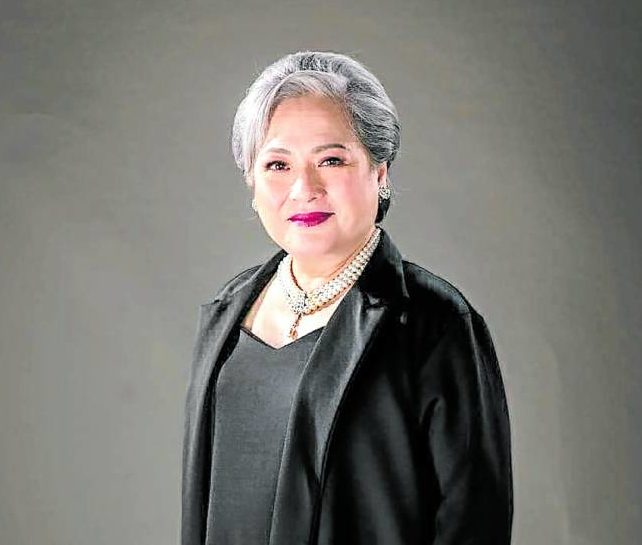
Gina Alajar
Talking to Gina Alajar after the story conference of Adolf Alix Jr.’s upcoming dramatic thriller “Pieta” was like taking a trip down memory lane.
The seasoned actress had racked up so many indelible portrayals in Filipino film classics—like “Brutal,” “Salome,” “Moral,” “Sister Stella L.” and “Orapronobis”—by the time I directed her in the second run of “The Vagina Monologues in Filipino” (TVM) in 2002.
Before that rare foray into theater, she was directed by the iconic likes of Lino Brocka, Ishmael Bernal, Marilou Diaz-Abaya, Mike de Leon, Peque Gallaga, Danny Zialcita, Celso Ad. Castillo, Laurice Guillen, Mario O’Hara, Mel Chionglo, etc.
But even then, Gina proved she still had so much more to give as a versatile performer—which makes her a perpetually compelling actor to watch. Despite the sensitive nature of Eve Ensler’s award-winning play, the celebrated dramatic actress took the thematic bull by the horns and dazzled in the production’s bittersweet comedic moments.
To my pleasant surprise, she was even easier to deal with offstage. Gina never expected special treatment and, despite having been in the business of show all her life, the former child actress was no tattletale.
In those days, I was already editing for PDI, mostly reviewing films, albums and concerts for the paper’s now-defunct Saturday Special section, whose editor was the much-missed writer/director/columnist Nestor U. Torre (NUT).
During breaks at TVM rehearsals, Gina and I would sometimes talk about Philippine movies, and she would occasionally rib me about the “not-so-pleasant” reviews I wrote about this or that film and actor. She would winkingly tell me, “Uy, baka hanapin ka ni … [lead actor’s name] (laughs)”—and we would have a good laugh over it.
Because of that experience, I got to know the actress as an artist who refuses to rest on her laurels. She’s diligent, takes her work seriously, and wants to continually grow.
No surprise
Thereafter, I wasn’t surprised when Gina got increasingly busy directing teleseryes for GMA Network, the most recent ones being “Prima Donnas,” “Onanay,” “Impostora,” “Pinulot Ka Lang sa Lupa” and the long-running “The Half Sisters.”
So, when I spoke to Gina at the story con, I asked her what she found satisfying about directing, How does one compare to the other?
“When you’re directing, you’re in control of the material, the set, and the atmosphere of the shoot,” Gina explained. “Every decision falls on your lap, even the smallest details. So it can get really tiring. But since you’re involved in all the aspects of production, it can also be very rewarding if you get the desired effect.
“It does get frustrating when your actor doesn’t get what you want him or her to do. Kaya minsan, naiisip ko, ‘Perhaps it would be easier kung ako na lang ang aarte n’yan, eh.’
“Meanwhile, if you’re acting, you get to play. It’s part of the fun of being an actor: You can transform into another person or just focus on creating a character. And it isn’t as tiring because you aren’t responsible for the other people on the set or how the working hours go.
“But I got the hang of it because, as artists, we love getting challenged. So I see directing as part of our everyday challenges.”
How are her directing skills informed by her experiences as an actress?
“I’m an actress first, so a lot of my experiences are enough to teach others, especially when I am directing and motivating actors. This comes into play when there’s emotionality involved. I have found effective ways to reach certain emotions, not just because of those experiences, but also because of what my directors have taught me.
“It helps that my skills have been honed by my forays into films, TV and theater—napapagsama ko lahat ‘yan para maituro sa iba when I’m directing. That’s how I pay it forward—and it becomes an added asset for me as a director.
“It doesn’t hurt that I’m an actress who has become a director because I understand where actors are coming from. I also know when they’re having a bad day… especially if they didn’t get enough sleep the night before or if there are other reasons. So, I understand that part where other directors cannot.”
Does Gina think she’s a better actress because of her time-honed ability a director?
“Not necessarily,” she pointed out. “Look, the first time I directed something, it was purely oido. I played it by ear, and didn’t know anything about the technical side of it. I started on TV, so alam ko lang na ang uno, nasa kaliwa, at ang dos, nasa kanan.
“But you know what helped me the most? My experiences in theater! Acting onstage taught me to block scenes with sense and purpose. When and where should actors move during a scene and why? It becomes a trigger point that carries them through it.
“Your skill and experiences as an actor can help inform your ability as a director. But the other way around, not so much.”